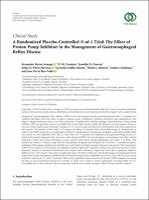| dc.contributor | Vall d'Hebron Barcelona Hospital Campus |
| dc.contributor.author | Sierra-Arango, Fernando |
| dc.contributor.author | Castaño, D. M. |
| dc.contributor.author | Forero, Jennifer D. |
| dc.contributor.author | Pérez-Riveros, Erika D. |
| dc.contributor.author | Ardila Duarte, Gerardo |
| dc.contributor.author | Botero Mejia, Maria L. |
| dc.date.accessioned | 2020-06-19T08:27:49Z |
| dc.date.available | 2020-06-19T08:27:49Z |
| dc.date.issued | 2019-12-17 |
| dc.identifier.citation | Sierra-Arango F, Castaño DM, Forero JD, Pérez-Riveros ED, Duarte GA, Botero ML, et al. A randomized placebo-controlled N-of-1 trial: the effect of proton pump inhibitor in the management of gastroesophageal reflux disease. Can J Gastroenterol Hepatol. 2019 Dec 18;2019:3926051. |
| dc.identifier.issn | 2291-2789 |
| dc.identifier.uri | https://hdl.handle.net/11351/5036 |
| dc.description | Control de acidez; Esomeprazol; Reflujo gastroesofágico |
| dc.language.iso | eng |
| dc.publisher | Hindawi |
| dc.relation.ispartofseries | Canadian Journal of Gastroenterology and Hepatology;2019 |
| dc.rights | Attribution 4.0 International |
| dc.rights.uri | http://creativecommons.org/licenses/by/4.0/ |
| dc.source | Scientia |
| dc.subject | Assaigs clínics |
| dc.subject | Reflux gastroesofàgic |
| dc.subject | Medicaments gastrointestinals |
| dc.subject.mesh | Randomized Controlled Trial |
| dc.subject.mesh | Gastroesophageal Reflux |
| dc.subject.mesh | Esomeprazole |
| dc.title | A randomized placebo-controlled N-of-1 trial: the effect of proton pump inhibitor in the management of gastroesophageal reflux disease |
| dc.type | info:eu-repo/semantics/article |
| dc.identifier.doi | 10.1155/2019/3926051 |
| dc.subject.decs | ensayo clínico controlado aleatorizado |
| dc.subject.decs | reflujo gastroesofágico |
| dc.subject.decs | esomeprazol |
| dc.relation.publishversion | https://www.hindawi.com/journals/cjgh/2019/3926051/ |
| dc.type.version | info:eu-repo/semantics/publishedVersion |
| dc.audience | Professionals |
| dc.contributor.authoraffiliation | [Sierra-Arango F, Castaño DM, Forero JD] Gastroenterology and Hepatology Department, Fundación Santa Fe de Bogotá, Bogotá, Colombia. School of Medicine, Universidad de los Andes, Bogotá, Colombia. [Pérez-Riveros ED, Ardila Duarte G] Fundación Santa Fe de Bogotá, Bogotá, Colombia. [Botero ML] Servei de Patologia, Vall d’Hebron Hospital Universitari, Barcelona, Spain |
| dc.identifier.pmid | 31929980 |
| dc.identifier.wos | 000522320100001 |
| dc.rights.accessrights | info:eu-repo/semantics/openAccess |

 Área privada
Área privada Contacto
Contacto







